 Petzlover
Petzlover Alangu Mastiff is originated from Pakistan but Tenterfield Terrier is originated from Australia. Alangu Mastiff may grow 55 cm / 22 inches higher than Tenterfield Terrier. Alangu Mastiff may weigh 60 kg / 133 pounds more than Tenterfield Terrier. Alangu Mastiff may live 4 years less than Tenterfield Terrier. Both Alangu Mastiff and Tenterfield Terrier has almost same litter size. Both Alangu Mastiff and Tenterfield Terrier requires Low Maintenance.
Alangu Mastiff is originated from Pakistan but Tenterfield Terrier is originated from Australia. Alangu Mastiff may grow 55 cm / 22 inches higher than Tenterfield Terrier. Alangu Mastiff may weigh 60 kg / 133 pounds more than Tenterfield Terrier. Alangu Mastiff may live 4 years less than Tenterfield Terrier. Both Alangu Mastiff and Tenterfield Terrier has almost same litter size. Both Alangu Mastiff and Tenterfield Terrier requires Low Maintenance.
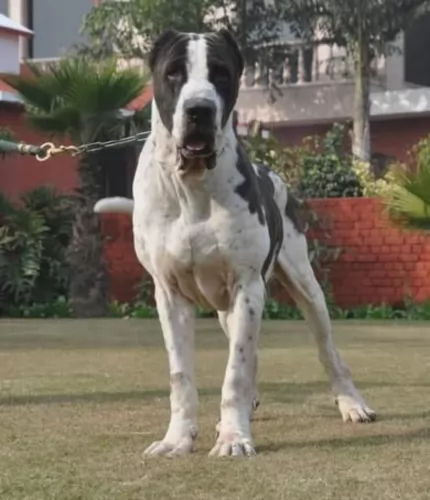 Alangu Mastiff is a breed that ,originates from southern India. Since the very beginning of this breed, it has been used as guard dogs and official dogs of Persian Army. They have been used mostly for wars and as a guard dogs for protection. Also, Alangu Mastiff was used as large gain hunters because of its size and power.
Alangu Mastiff is a breed that ,originates from southern India. Since the very beginning of this breed, it has been used as guard dogs and official dogs of Persian Army. They have been used mostly for wars and as a guard dogs for protection. Also, Alangu Mastiff was used as large gain hunters because of its size and power.
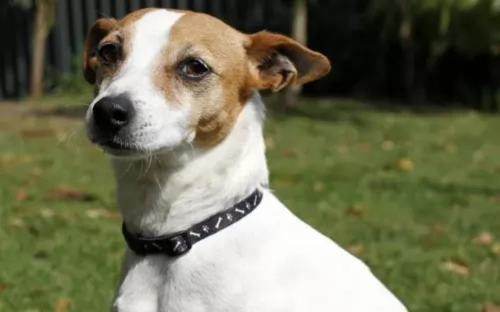 The ancestors of the Tenterfield Terrier came to Australia with the British and from them came this Australian breed. The English terriers were bred to be ratters on the ships to Australia. Today’s breed is a hardy, strong, athletic and agile dog. These first dogs were miniature Fox Terriers, bred for ratting. The miniature Fox Terrier was an established breed in the late 19th century in Australia with families and was know as a Mini Foxie. The breed became a steady presence in homes by the 1920’s.
The ancestors of the Tenterfield Terrier came to Australia with the British and from them came this Australian breed. The English terriers were bred to be ratters on the ships to Australia. Today’s breed is a hardy, strong, athletic and agile dog. These first dogs were miniature Fox Terriers, bred for ratting. The miniature Fox Terrier was an established breed in the late 19th century in Australia with families and was know as a Mini Foxie. The breed became a steady presence in homes by the 1920’s.
The breed might not have been named after the area of Tenterfield as many have guessed. Instead they may have been named after a breeder. The owner of the Tenterfield saddlery was called Tenterfield Saddler and he owned several of the breed. In 1990, Don Burke, a television personality suggested the breed be named the Tenterfield Terrier.
The Miniature Fox Terrier Club of South Australia. Now there were several clubs in Australia and a lot of disagreement about exactly what type of dog a miniature fox terrier was. Some did not think the name was legitimate, but they wanted recognition from the Australian National Kennel Club (ANKC). So, they became the Tenterfield Terrier Club of Australia in 1993. They were recognized by 2002.
Today the breed standard for the Tenterfield Terrier is different from the one for the Miniature Fox Terrier. They are now entirely separate breeds. In addition to the ANKC, the breed is recognized by the New Zealand Kennel Club but not by the AKC. It is also recognized by the American Pet Registry, Inc, the American Canine Registry and the Dog Registry of America, Inc.
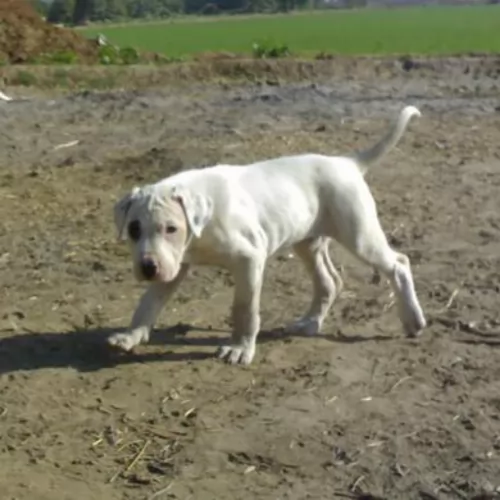 Weight of Alangu Mastiff depends but approximately, male weight is 70-90kg, while females are 60-70kg. While males height is 76-86cm. Females are slightly smaller with an average height of 75-80cm.
Weight of Alangu Mastiff depends but approximately, male weight is 70-90kg, while females are 60-70kg. While males height is 76-86cm. Females are slightly smaller with an average height of 75-80cm.
Lifespan depends drastically on every breed, but it is approximately 8-10 years.
The average litter size of Alangu Mastiff is 6-8 puppies.
Another Name for Alangu Mastiff is Sindh Mastiff.
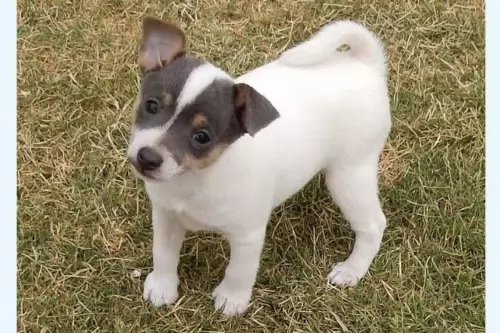 The Tenterfield Terrier is square and compact. He has a head shaped like a wedge and unusual in the terrier group. They have pricked ears and are predominantly white mixed with tan or black. They could also be tri-colored in black/tan and white or tan/liver and white. They have naturally occurring bob tails or docked tails. The nose is usually black unless the dog is liver colored, they have liver noses. The jaws are strong, and lips are tight with a strong neck.
The Tenterfield Terrier is square and compact. He has a head shaped like a wedge and unusual in the terrier group. They have pricked ears and are predominantly white mixed with tan or black. They could also be tri-colored in black/tan and white or tan/liver and white. They have naturally occurring bob tails or docked tails. The nose is usually black unless the dog is liver colored, they have liver noses. The jaws are strong, and lips are tight with a strong neck.
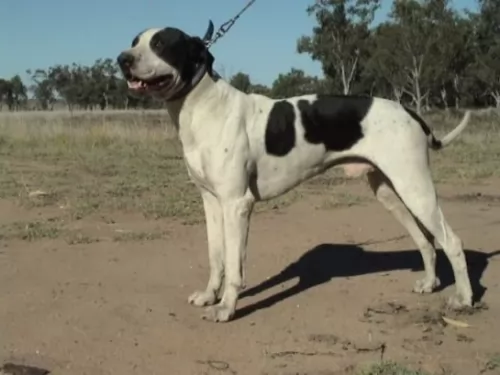 Alangu Mastiff is a very powerful breed. They are a giant breed that is very strong and protective. If you are first time owner, you definitely don’t want this breed as your first pet. They can be very aggressive, and if you are not a dominant owner who knows what he is doing all the time, you can have a lot of troubles with this breed. Alangu Mastiff is a guard dog, and they tend to protect the family no matter what is happening. Of course, with proper care and socialization, they can be wonderful pets that love family, and they can be gentle with children too. Basically, it is very important to socialize them from the earliest age. Alangu is also very hard to train, so you have to be patient and devote a lot of time to train your dog properly. Since they are large dogs, they require a lot of exercises. Walking with the leash is not enough for this breed. They need to run to be fully happy. They can be very aggressive towards other dogs, so it is not very recommendable to spend time with other pets, at least not if they are not socialized. If you train them from an early age, then you should still be careful how your dog behaves around other pets and animals. Don’t get this wrong, Alangu can be a wonderful pet for the whole family, but you have to be careful and well-trained for this breed. They require a lot of attention, patience and time, but overall they can be amazing pets.
Alangu Mastiff is a very powerful breed. They are a giant breed that is very strong and protective. If you are first time owner, you definitely don’t want this breed as your first pet. They can be very aggressive, and if you are not a dominant owner who knows what he is doing all the time, you can have a lot of troubles with this breed. Alangu Mastiff is a guard dog, and they tend to protect the family no matter what is happening. Of course, with proper care and socialization, they can be wonderful pets that love family, and they can be gentle with children too. Basically, it is very important to socialize them from the earliest age. Alangu is also very hard to train, so you have to be patient and devote a lot of time to train your dog properly. Since they are large dogs, they require a lot of exercises. Walking with the leash is not enough for this breed. They need to run to be fully happy. They can be very aggressive towards other dogs, so it is not very recommendable to spend time with other pets, at least not if they are not socialized. If you train them from an early age, then you should still be careful how your dog behaves around other pets and animals. Don’t get this wrong, Alangu can be a wonderful pet for the whole family, but you have to be careful and well-trained for this breed. They require a lot of attention, patience and time, but overall they can be amazing pets.
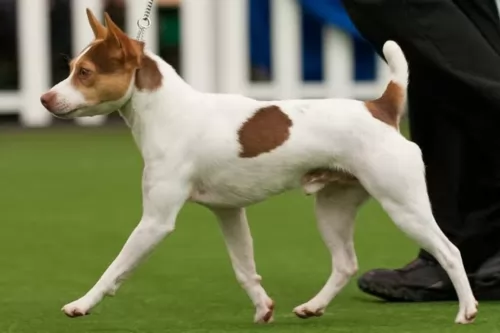 3.Adaptability – they need space even though they are small. They need a lot of exercise. They can adapt if they get another exercise. They can live in apartments and can play indoors as well as out.
3.Adaptability – they need space even though they are small. They need a lot of exercise. They can adapt if they get another exercise. They can live in apartments and can play indoors as well as out.
4.Learning ability – They are extremely intelligent, but they can be stubborn like all terriers.
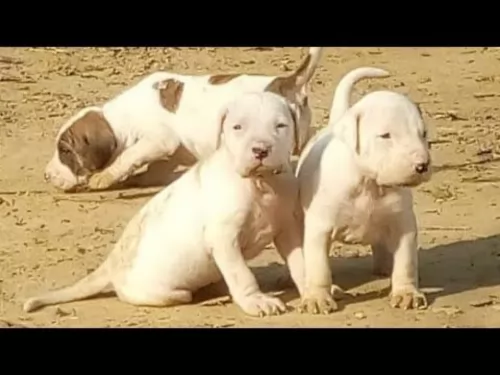 Basically most of the health problems depend on the dog to dog. If you choose puppy carefully, with an adequate examination of professional you will have a healthy dog. Alangu Mastiff is overall healthy breed, but as every other breed, they can develop some issues. Hip dysplasia is can be common for this breed, but again, only if you don’t select your puppy carefully.
Basically most of the health problems depend on the dog to dog. If you choose puppy carefully, with an adequate examination of professional you will have a healthy dog. Alangu Mastiff is overall healthy breed, but as every other breed, they can develop some issues. Hip dysplasia is can be common for this breed, but again, only if you don’t select your puppy carefully.
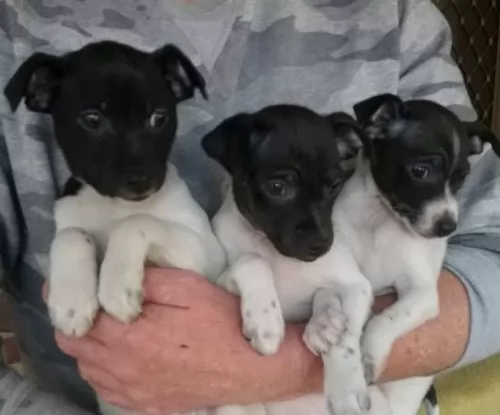 They are small in stature and because of their face they seem to have dental issues. The breed does not have a lot of health issues but deals with the same issues as many small terriers. Not all members of the breed are susceptible to these, but some are just like the Australian Terrier.
They are small in stature and because of their face they seem to have dental issues. The breed does not have a lot of health issues but deals with the same issues as many small terriers. Not all members of the breed are susceptible to these, but some are just like the Australian Terrier.
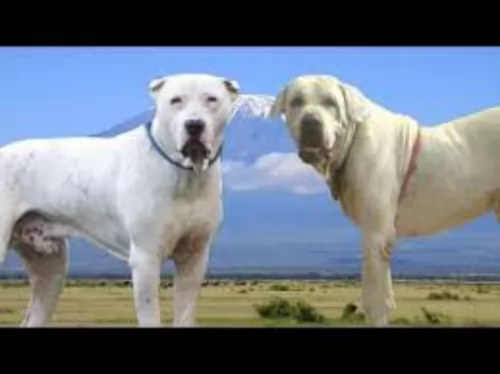 Feeding of your dog highly depends on activity, size, and food that you are feeding your dog. 5-10 cups of high-quality food divided into 2 meals would be enough for an average Alangu Mastiff, but again, you should feed your dog based on activity.
Feeding of your dog highly depends on activity, size, and food that you are feeding your dog. 5-10 cups of high-quality food divided into 2 meals would be enough for an average Alangu Mastiff, but again, you should feed your dog based on activity.
Puppies must eat 3-5 times per day, few cups of high-quality food. They need to eat quality food with a lot of vitamins and minerals to develop into a happy and healthy adult.
Groming is one of the easiest jobs that you should do around your Alangu Mastiff. They are very easy to take care off. Few brushes every now and then would be enough to have perfectly groomed pet. They do not have long coats with a lot of fur so there will be no hair around the house, and maintaining this majestic creature is very easy.
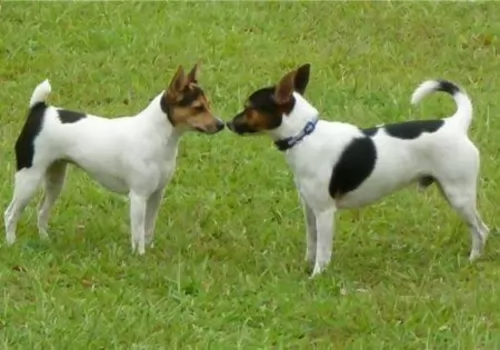 1.Feeding the puppy – Don’t overfeed but do feed high quality puppy food for small breeds and terriers.
1.Feeding the puppy – Don’t overfeed but do feed high quality puppy food for small breeds and terriers.
2.Feeding the adult – This is an active breed but don’t overfeed. Feed a high quality adult dog food for terriers or small breeds. Feed 2 times a day.
4. Games and Exercises – The breed has a high energy level and needs a lot of exercise. He is a terrier and loves to “go to ground”. Play activities that allow him to do that are best. He plays barn hunt, lure coursing and terrier specific competitions.